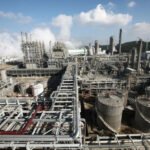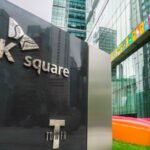President Yoon Suk Yeol speaks at a policy debate at the Jeju Free International City Development Center on Jeju Island
South Korea will designate its resort island Jeju as a test operation zone for flying taxis as part of the country’s national urban air mobility (UAM) project.
At a government policy debate forum on the island on Tuesday, President Yoon Suk Yeol also said the central government will provide active support for the Jeju government’s initiative to develop a new mega seaport and a second airport on the island.
“The government will designate Jeju Island as a test zone for flying taxis to support its tourism industry. UAM will be a key pillar of Jeju’s tourism infrastructure,” he said at the forum held at Jeju Free International City Development Center.
Dubbed a flying taxi, UAM is an advanced air mobility service featuring electric vertical take-off and landing, or eVTOL, craft without the need for a runway in a city center and connectable to other land transportation methods.
Rendering of an envisioned air taxi vertiport on Jeju Island (Courtesy of Korea Airports Corp.)
Jeju plans to apply to the Ministry of Land, Infrastructure and Transport in 2025 for designation as a UAM pilot operation zone.
The central government and the Jeju Province plan to initially set up vertiports for air taxi takeoffs and landings in three locations: Jeju International Airport, Seongsan Port in Seogwipo and the Jungmun Tourist Complex.
Jeju has been jointly pushing ahead with a UAM project with Korea Airports Corp., Hanwha Systems Co. and SK Telecom Co.
Officials said aircraft for the pilot air taxi service will be manufactured by Joby Aviation, a California-based UAM developer, in which SK Telecom has a stake.
SK Telecom partners with Joby Aviation for UAM business in Korea
NEW SEAPORT, NEW AIRPORT
During the policy forum, President Yoon also outlined plans to build a new seaport and a second airport, which are part of his presidential campaign pledges.
“The government will closely cooperate with Jeju for the rapid completion of the second airport,” he said.
He said the government will also accelerate the development of a new Jeju seaport on reclaimed land off Tapdong, Jeju City to create facilities capable of docking four large cruise ships simultaneously, along with logistics, tourism and shopping infrastructure.
Supernal’s S-A2, an eVTOL flying-car concept (Courtesy of Hyundai Motor)
GREEN ENERGY, TERTIARY HOSPITAL
The president said the government will foster Jeju as a hub for the green energy business.
At the policy forum, the government announced plans to invest 56 billion won ($41 million) in green hydrogen projects by 2026 and launch pilot projects to recycle used electric vehicle batteries in agriculture equipment and energy storage systems.
He said the government will positively consider the installation of clean hydrogen production facilities using biogas if Jeju applies to participate in the project.
The central government also plans to designate a tertiary general hospital in Jeju to allow 700,000 Jeju people easier access to an advanced surgery and healthcare system and treatment of severe illnesses.
By Se-Min Huh and Kwang-Sik Lee
semin@hankyung.com
In-Soo Nam edited this article.















